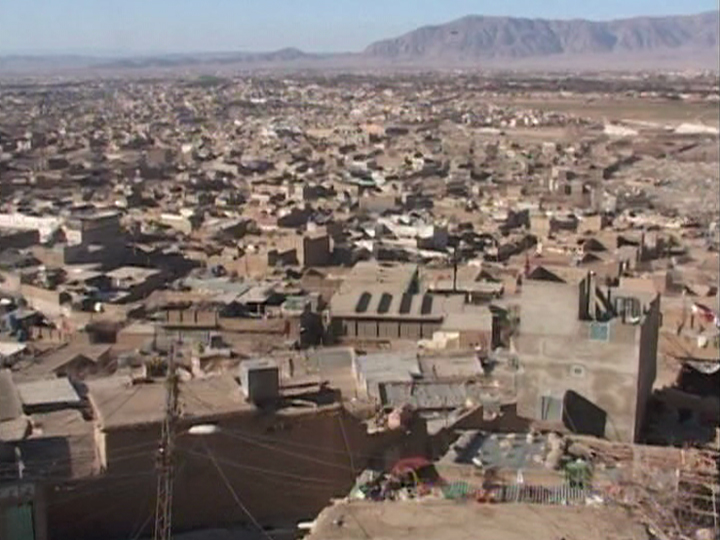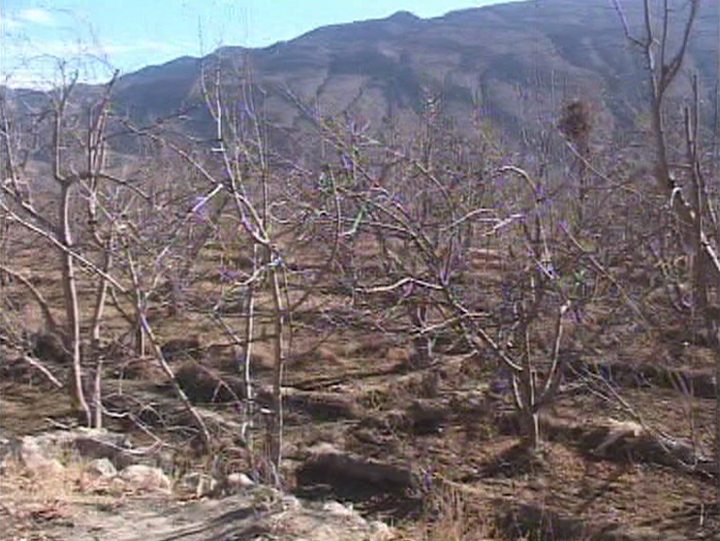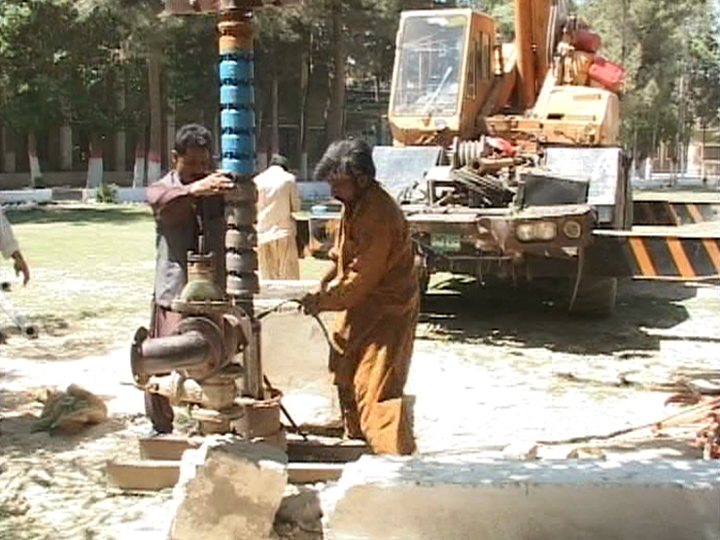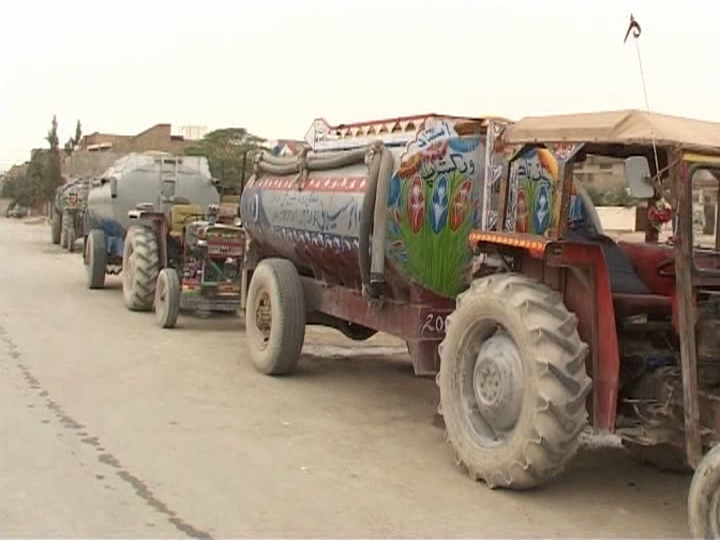Quetta: The experts call it suicide. But the people of Quetta are fast running out of choice as water shortage in and around the valley force them to resort to desperate measures.
As years of recurring drought and drilling of tube-wells has depleted the water table, authorities in the arid Balochistan province have increasingly tapped into hard-rock aquifers to meet the water needs of a burgeoning city. Given that they take over a thousand years to replenish, geological experts say mining hard-rock aquifers could herald a severe water crisis over the coming years.
“The people of Quetta are committing collective suicide,” Dr. Din Mohammad Kakar, Director of Geology Department in University of Balochistan, told News Lens. “With the government and public extracting fossil water through more than seventy tube-wells in various parts of Quetta, our future generations will die of thirst.”

Unlike alluvial aquifers that could be replenished by rain and snow, fossil aquifers are a non-renewable groundwater resource. Also called paleowater – paleo means older or ancient, especially relating to geological past – fossil aquifers are reserves of fresh water created over millennia, lying undisturbed underground. According to hydrogeologists, fossil water aquifers are hard to replenish because they were created under climatic conditions that exist no more.
That means once used up, fossil aquifers are gone for good.
“Past climatic conditions made it possible to store vast groundwater resources in deep underground reservoirs,” says UNESCO’s guidebook on Socially Sustainable Management of Non-renewable Groundwater Resources. “Some of these systems are the heritage of previous, more humid climatic conditions that existed thousands of years ago, and some of them are located in regions that today suffer from arid or hyper-arid climatic conditions and receive little contemporary natural recharge.”
The use of fossil aquifers and the fact that they hard to recharge is a cause of concern anywhere, says Kakar. But for a city like Quetta where water has become increasingly scarce, experts see them as the last resort, saved for emergency use amid dire predictions that the valley will turn to desert soon.

“If steps are not taken immediately, the people of Quetta will become water refugees in very near future,” says Dr. Kakar. He said there was a lot of snow and rain in Quetta thousands of years ago that created fossil aquifers in the bedrock of Balochistan’s mountainous regions. “It is very old water that has accumulated underground over thousands of years. Once used up, it will take thousands of years to replenish.”
For many a water-deficient nation, paleowater is the only means of survival they have. Countries like Jordan, Libya, Israel, Egypt and Saudi Arabia – all desert nations with chronic shortage of water – have been tapping into fossil aquifers for long now. Indeed Libya only became habitable because of fossil aquifers, some as old as 75,000 years old. In that sense, experts say, fossil water is as precious for the thirsty nations as fossil fuel is for others.
Mike Edmunds, a hydrogeologist at Oxford University, told National Geographic that people often don’t know that they are tapping into fossil waters. Wells are drilled to about 320 feet globally where only the top few feet have water that is recently accumulated. In Balochistan, as underground water has drastically depleted over the years, people have been dig deeper and deeper to access water.

In parts of Balochistan, where climate change has caused decades of drought and frequent floods, the underground water level has dropped as low as 1000 feet. In a province where people still rely on farming in absence of an industrial economy, people have responded to water shortage by digging more and more tube-wells. In view of water shortage, there has been a lot of emphasis over the last couple of decades on farming low-delta crops like olives instead of the traditional grapes and apples that use up a lot of water.
According to Dr. Din Mohammad Kakar, authorities need to initiate a three-pronged strategy to bring relief to the province’s population. “First, we should do away with crops that depend on ground water for irrigation and the farmers should be compensated for this. Second, not a drop of rainwater should go waste; it must be preserved in dams to help recharge ground water. And last, it is necessary to recycle the waste water. It can be recycled a thousand times for frequent use.”
While drought, delta-farming and lack of dams may have led to acute shortage of water in Quetta, environmentalists often point to the dramatic increase in population as one of the causes. For a city built for 50,000 after the devastating 1935 earthquake, Quetta is now home to a population that is 60 times greater.
“The current population of Quetta is approximately 3 million when the city and its infrastructure was made for few thousands,” Dr. Amir Pervaiz, an economist associated with the Pakistan Water Partnership, told News Lens Pakistan. “The city population needs as many as 50 million gallons ever day whereas the groundwater capacity is only 30 million.”

The Balochistan Conservation Strategy, a document on sustainable use and renewal of natural resources developed by the International Union for Conservation of Nature and Natural Resources (IUCN), predicted the death of Quetta due to water shortage back in 1990s. As a solution to the burgeoning rise in population, it suggested that the provincial capital should be shifted to another location.
“Thirty years ago, experts suggested that reliance on tube-wells for agricultural irrigation should stop,” said Faiz kakar, Director IUCN Baluchistan. “But even today, people continue irrigate arable land in Quetta with water from tube wells.”
Iqbal kakar, a geoscientist, told News Lens that without long-term strategies aimed at preservation of available water resources through constructing dams, it was not possible to provide water to such an immense population.
“The situation has reached a point where within next few years, Quetta will turn into a wasteland,” he said.
Besieged by a number of challenges – both natural and man-made – experts say that a possible solution to deal with chronic water shortage is to manage the scarce water resources.
Dr. Perzvaiz said Quetta roughly received 185 mm rainfall annually, of which only 20 to 30 percent infiltrate soil to restore groundwater reserves. “The rest of 70 percent is lost due to outflow because there are no dams to contain the scarce rainwater.”
Quetta, said Dr. Pervaiz, did not fall in the monsoon region like parts of Punjab and Sindh. The last time Quetta received high precipitation was in on December 2000 when it rained 113 millimeters (4.4 in) during 24 hours of rainfall.
During the first government of Mian Nawaz Sharif in the early nineties, Balochistan was allotted an additional share of water under the Indus Water accord. The province could not take it in its share due to absence of infrastructure.
Says Dr Pervaiz: “A major solution to Quetta water issue is to use the quota the province got under the Indus Water Accord in 1991. That 2 million acre feet of water is more than enough for the needs of Baluchistan and Quetta.”
In the government and policy circles, the impression that dams are a panacea for Balochistan’s water-woes is rampant. But not everyone agrees with the solution. Sardar Muhammad Tariq, former chief executive of Water and Power Development Authority (WAPDA), says, “big dams are not possible in Balochistan due to its mountainous terrain and small dams cannot possibly recharge the ground water because in case of drought, they will dry out within ten days.”
He said water scarcity was caused by mismanagement but it could be addressed with construction of Burj Aziz khan Dam outside Quetta and completion of Mangi Dam in Ziarat. “If the problem exacerbates in near future as it surely would, we will have no option but to lay out a canal system to bring in water Indus water to Quetta.”
Already, shortage of water and protracted power outages that render tube-wells useless despite their proliferation, has spelled ruin for agriculture in the province. With no water to irrigate them, apple orchids are drying out and in many places they have been reduced to tree stumps as people cut them down.
“Before drought and power outages, the production of apple in the province was between five to six million tonnes every year,” said Adbul Rehman Bazai, General Secretary of Baluchistan Landowner Action Committee. “Now it has fallen to three and a half million tonnes. The apple production in the province will come to an end if the authorities don’t do something about the water crisis immediately.”
Bazai said water was found in Balochistan at a depth of 330 feet a few years ago. Now people have to dig to 1200 feet to get to underground water.
For the people of Quetta, water shortage has become an ongoing crisis they have to contend with day after day. Some say it is more threatening than terrorism that has long been the bane of Balochistan province due to insurgency, militancy and sectarianism.
“Without water, life cannot endure,” says Raz Mohammad, who runs a water-bowser service for households in Quetta. “The intense shortage of water contributes to poverty in the city because people who are already poor have to pay dearly for water.”
With summer approaching, says Muhammad, people’s demand for water will go up. “In summer people need more water but we cannot provide everyone because tankers have to wait in long queues for hours to fill water at tube-well points that are few in number.”
As with anything in short supply, water-shortage has led to exploitation of citizens at the hands of officials and water mafias. Dawood Khan, a resident of Jan Muhammad Road in Quetta, said the local valve-man – a term used for the official who regulates water supply to different neighbouhoods – often closes down water supply, forcing people to order water through the tanker mafia. He said the valve-man charged tanker owners PKR 400 on every delivery.
“I have complained five times to the relevant department against tanker owners and the valve-man but they don’t take any action,” said Muhammad. “Because of this, every house on our street has to spend Rs 5,000 on water every month.”




I appreciate you for this research based article and invite you to contact public health engineering deptt GoB so that the steps initiated by government to combat the situation could be shared. In the recent past we arranged a National seminar on water crisis in Quetta & way forward. Most of the speakers referred in your article were present.As an outcome of the recommendations of the seminar work on various options for tapping surface water has been initiated.